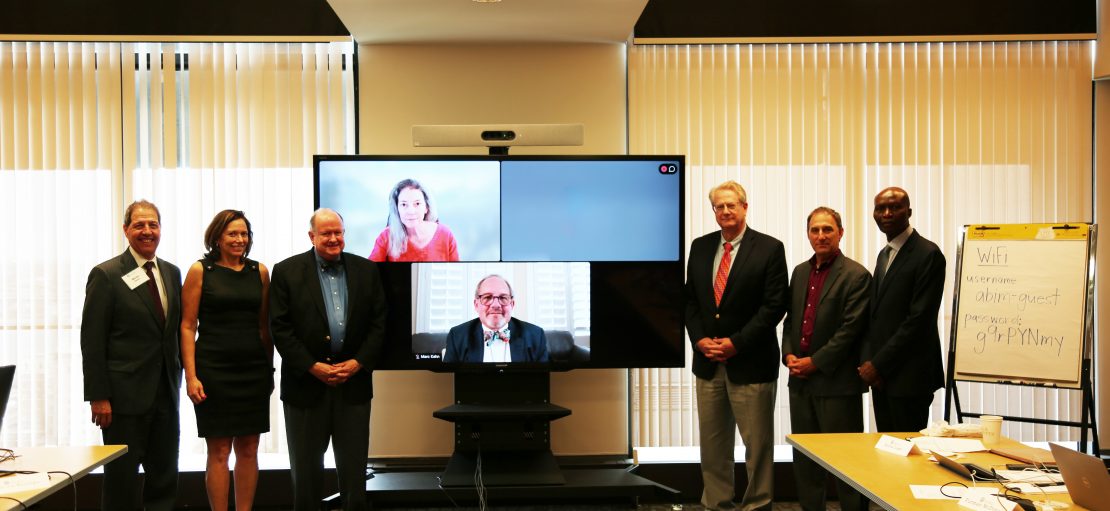The Hematology Board held its spring meeting on Tuesday, May 16, 2023. The agenda provided an opportunity to update the Specialty Board on activity at ABIM and allowed for discussion of pressing issues in the field. The Hematology Board was joined by guests from the American Society of Hematology (ASH).
The following is a summary of the spring meeting.
ABIM and the Hematology Board gratefully acknowledge the service of Specialty Board members with terms ending June 30, 2023: Mark M. Udden, MD, who served as chair since July 1, 2017; Marc J. Kahn, MD, MBA, who joined in 2018; Selina M. Luger, MD, who joined in 2019; and Marc S. Zumberg, MD, who joined
in 2017. Morie A. Gertz, MD, MACP, Chair of the Hematology LKA Approval Committee, was appointed by the ABIM Board of Directors as the new Chair of the Hematology Board beginning July 1, 2023. In addition, three new members, Nicholas Burwick, MD, of the University of Washington; Samer Al’Hadidi, MD, MS (CRDSA), FACP, of the University of Arkansas for Medical Sciences; and Iberia Romina Sosa, MD, Ph.D., of Fox Chase Cancer Center have joined the Specialty Board.
Conversation with the President
Prior to the meeting, members and guests of the Hematology Board received a video update from Richard J. Baron, MD, MACP, President and Chief Executive Officer of ABIM and ABIM Foundation, highlighting progress and inviting discussion from the Specialty Board on some of ABIM’s leading priorities, including:
- The release of the first Longitudinal Knowledge Assessment (LKA®) quarterly formative score reports to more than 28,000 diplomates who completed the fifth quarter of their five-year LKA cycle. The score reports are designed to let participating diplomates know how they are performing relative to the passing score and help identify any areas they may want to focus on in their future studies.
- Ongoing work in diversity, equity and inclusion (DEI), such as performing differential item functioning analysis of assessment items, developing health equity content in different disciplines, and co-funding health equity projects for residencies.
- Developments from the ABIM Board of Directors’ strategic planning work, such as exploring how new technologies like artificial intelligence (AI) and machine learning may help ABIM work more efficiently and develop better programs for physicians.
- Continued work with a coalition of national medical organizations to address medical misinformation and promote evidence-based information. Dr. Baron recently coauthored an article in the New England Journal of Medicine and spoke at both the University of California San Francisco Department of Medicine Grand Rounds and South by Southwest on the topic of misinformation.
Members of the Specialty Board raised concerns about the implications of new advancements in AI for testing, to which Dr. Baron emphasized the complexity of assessment questions and the rigorous process of test development.
The group also discussed how to advance DEI in the workforce, especially in states where there is strong opposition. Dr. Baron highlighted ABIM’s DEI efforts, noting that it is limited to the parameters of the organization and its mission, but adding that society partners have been able to augment it with mentorship programs and DEI-focused pathways to diversify the workforce.
Misinformation and Implications for Hematology
The Specialty Board held an open discussion on the implications of misinformation for the discipline of hematology, including its effects on patient care, in order to contribute to ABIM’s ongoing strategic conversations about the issue. In discussion, the group’s comments fell into four themes:
- Misinformation about alternative treatments, in particular alternatives to chemotherapy, which many patients have misconceptions or negative opinions about. Some patients tend to believe that more natural or benign therapies are available but not recommended by physicians. There are reports of alternative therapies coming up in support groups and of patients even bringing printed copies of “studies” to their physicians to justify their use.
- Misinformation leading to distrust of physicians, namely that some patients believe physicians know why they have a disease and what the cure is but are withholding the information for personal gain.
- Misinformation about vaccines, specifically the efficacy and safety of COVID-19 vaccines, especially for patients with thrombosis, sickle cell disease, etc. Members of the group pointed out that many patients do not understand immunity, which may be contributing to vaccine hesitancy, but also want to “boost” immunity without understanding it.
- Misinformation on the internet and social media, including the increase of medical terminology in “quackery” (e.g., cytokine activation, signal transduction), making it more convincing to patients and more challenging for physicians to refute. The group identified an increase in online chat groups now being mentioned as reputable sources by their patients and emphasized the importance of well-established patient advocacy groups to counter misinformation of this nature.
Special Consideration Pathway Pilot Program for International Medical Graduates Who Meet ACGME’s Exceptionally Qualified Candidate Criteria
The ABIM Council—which comprises the chairs of the individual specialty boards and advisory committees, as well as public and patient members—is exploring the idea of pursuing a pilot program to create a pathway to initial certification and MOC for international medical graduates (IMGs) who have completed their internal medicine training in another country and then completed accredited fellowship training in the U.S. The Accreditation Council for Graduate Medical Education (ACGME) has established criteria for exceptionally qualified internationally trained residents to enter accredited fellowship programs and continue if they are successfully assessed on the core competencies of ACGME and the American Board of Medical Specialties (ABMS). Physicians with that training background are currently ineligible for certification/MOC because their residency training is not ACGME-accredited.
Using the principles of competency-based medical education, a pilot would offer the opportunity to assess the knowledge and skills of these physicians who have successfully completed their accredited fellowships as a pathway to initial certification eligibility in Internal Medicine and the subspecialty of their fellowship. Like other ABIM diplomates, physicians in the proposed pilot would need to pass the ABIM Internal Medicine Certification Examination to be eligible for subspecialty certification.
Members of the Specialty Board were generally positive about the proposed pilot, looking forward to the results, and encouraging ABIM to get feedback from program directors and eligible trainees, which staff assured them would be part of the Council outreach process. ABIM would also need to receive approval to offer the pilot from ABMS.
Update from the American Society of Hematology
Robby Reynolds, MPH, Senior Director of Hematology Workforce and Career Development for ASH, provided an update on the ASH Hematology-Focused Fellowship Training Program (HFFTP). Funded entirely by ASH, ten new hematology-focused fellowship tracks have been created within existing hematology-oncology programs at nine rigorously selected institutions across the United States. Shortly thereafter, three additional institutions independently created their own hematology-focused fellowship training programs and joined ASH’s HFFTP consortium as Alliance Partner Institutions. Mr. Reynolds reported that ASH’s efforts will yield 75 new hematology-focused fellows graduating by 2030, rather than the planned 50, highlighting the program’s cascade effect on the hematology community by inspiring other institutions to follow ASH’s lead. More information about ASH’s HFFTP is available online.
Specialty Board Oversight of Assessments
The specialty boards that oversee each discipline of internal medicine are responsible for reviewing and approving the assessment blueprints and standards for certification, Maintenance of Certification (MOC) and the LKA. Each spring, the specialty boards review data related to the population of new graduates entering the discipline, diplomates maintaining their certification, workforce information, and assessment performance trends and feedback. Periodic review of these data helps to inform the specialty boards’ assessment decisions. The Hematology Board discussed assessment data in the discipline and provided feedback to ABIM staff about which data were most helpful for ongoing oversight of assessment. Some of the data the Specialty Board reviewed are publicly available on ABIM’s website, including:
- Relative distribution of fellows in training per discipline
- Percentage of first-year fellows who are female by subspecialty
- Initial certification pass rates by discipline
- MOC pass rates by discipline
- Number of candidates certified in each discipline each year
Staff outlined the projected need for physicians to join the Item-Writing Task Force—the group responsible for writing all of the content for the LKA and the Initial Certification and Traditional, 10-Year MOC exams in each specialty. A complete list of openings can be found online.
The Specialty Board and guests also heard some information about the LKA. To date, 79% of hematology diplomates with an assessment due in 2023 have chosen the LKA to maintain certification. Staff also confirmed that data gathered over the first year of the LKA’s availability indicate that most questions on the LKA are answered in under two minutes.
Supporting a Quality Agenda in Hematology
In late 2021, ABMS—which comprises 24 medical certifying boards in the U.S., including ABIM—published new standards for continuing certification. The standards include a requirement for member boards like ABIM to facilitate the development of a discipline-specific quality agenda. Richard G. Battaglia, MD, FACP, ABIM’s Chief Medical Officer, spoke to the Hematology Board about the new standard. He emphasized that this standard is not resulting in an individual diplomate requirement to complete quality improvement activities for ABIM MOC. Dr. Battaglia invited the group to discuss how they envision ABIM engaging external stakeholders to identify issues that can serve as elements of a mutually agreed quality agenda in the discipline and the role the Specialty Board can play in this process.
The group agreed that this is a good opportunity for public and interprofessional members of the Specialty Board to be more involved and added that ASH would be a natural partner in this work.
Update from the Hematology Approval Committees
Morie A. Gertz, MD, MACP, Mayo Clinic; Chair of the Hematology LKA Approval Committee
Robert T. Means Jr., MD, James H. Quillen College of Medicine, East Tennessee State University; Chair of the Hematology Traditional, 10-Year MOC Exam Approval Committee
There are two ABIM Approval Committees working with the Hematology Board: the Traditional, 10-Year MOC Exam Approval Committee (which also deals with the initial certification exam) and the LKA Approval Committee. Approval Committees are responsible for approving all assessment content and maintaining the assessment blueprints in their discipline. Dr. Means briefly updated the Specialty Board on the work of the Approval Committees, noting how the process of creating and approving items for assessments has changed from the prior structure of exam committees that wrote and approved all items to the present structure of the Item-Writing Task Force and Approval Committees working together. ABIM staff is working with the Approval Committees to continue to improve Item-Writer training, feedback delivery and engagement.
Selecting New Members of the Hematology Approval Committees
The Hematology Board reviewed physician candidates for open positions on the Hematology Traditional, 10-Year MOC Exam Approval Committee and LKA Approval Committee. After discussion and reviewing the current composition of the committees, the Specialty Board voted to approve Danielle Shafer, DO, of Inova Schar Cancer Institute for the open position on the Traditional, 10-Year MOC Exam Approval Committee. In addition, they voted to approve Juliana Alvarez Argote, MD, of the Medical College of Wisconsin; Lisa Boggio, MD, of Rush Hemophilia and Thrombophilia Center; Margaret Kasner, MD, MSCE, of Sidney Kimmel Medical Center; and Peter Kouides, MD, of Rochester Regional Health for the Hematology LKA Approval Committee.
Hematology Blueprint Review and Nomenclature
As part of an ongoing effort to ensure ABIM assessments are relevant to today’s practicing specialists, ABIM has developed a framework for considering more focused assessments. To do this, ABIM develops a version of an assessment with a modified blueprint that continues to cover the breadth of the field, but better aligns to the practice of a large subgroup within the discipline through an evidence-based process involving the physician community. In 2022, the Hematology Board reviewed information on the possibility of introducing two additional subspecialized focused exam blueprints for physicians to choose from in addition to the current Hematology LKA. A cluster analysis identified an opportunity for two new specialized versions of the Hematology LKA: Malignant and Classical (Non-Malignant). The Specialty Board received a presentation on the status of the Hematology LKA focused assessments, an overview of the blueprint analysis process and the final blueprint values chosen by the LKA Approval Committee.
The group voted to approve the two new blueprints for focused versions of the Hematology LKA, which are scheduled to launch in 2025. ABIM staff acknowledged the need for additional item-writers and Approval Committee members to prepare for the additional assessments, and recruitment is underway. The Hematology Board approved four additional Approval Committee members at this meeting (see above). Dr. Gertz echoed the need for more recruitment and will be part of the onboarding process for new members.
In 2022, ASH formally adopted the term “classical hematology” in place of “non-malignant” or “benign” to refer to a broad range of non-cancerous blood disorders. As a result, ASH requested that the Specialty Board adopt the same terminology moving forward. After a brief presentation on the standard naming conventions for the LKA, the Specialty Board agreed to ABIM exploring the use of “Classical (Non-Malignant)” as a proposed name for the specialized version of the Hematology LKA to remain congruent with naming conventions adopted more widely by other organizations, including ASH. ABIM will conduct physician testing of the proposed name before it is finalized. More information about the rationale for the change in terminology is available on ASH’s website.
Communications and Governance Engagement
John Held, Senior Director of Communications, and Peter McConnell, Program Manager for Governance and Medical Society Communications, updated the Specialty Board on ABIM’s ongoing communications work with Governance (the ABIM Board of Directors, ABIM Council, Specialty Boards and Advisory Committees, and Approval Committees) and invited Specialty Board members to participate in engagement work. The communications team regularly engages ABIM Governance members to help give diplomates a better understanding of the individuals representing their interests in each discipline, and to help the community better understand the value of certification.
Specialty Board members provided feedback about how they could continue to take an active role in ABIM’s communications initiatives with diplomates, the medical community and the public, such as through media interactions, the ABIM blog and working with their colleagues and medical societies.
In Closing
The Hematology Board values the feedback and commentary of the entire medical community, including diplomates and society partners.
Do you have any questions? Are you interested in getting involved?
If you have questions after reading this report, please connect with us through the following channels:
- Subscribe to the ABIM blog.
- Call 1-800-441-ABIM (2246).
- Email request@abim.org.
- Join our Governance to help guide our future direction.
- Join our Community Insights Network to share your feedback.




